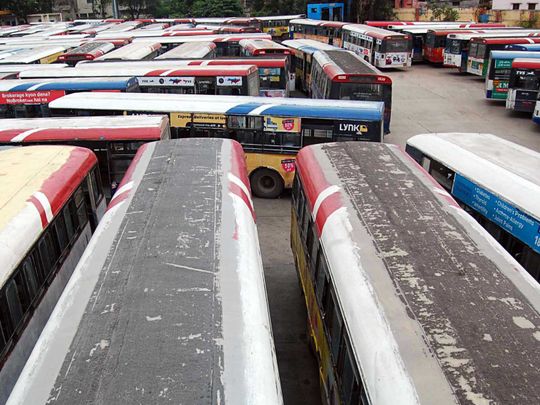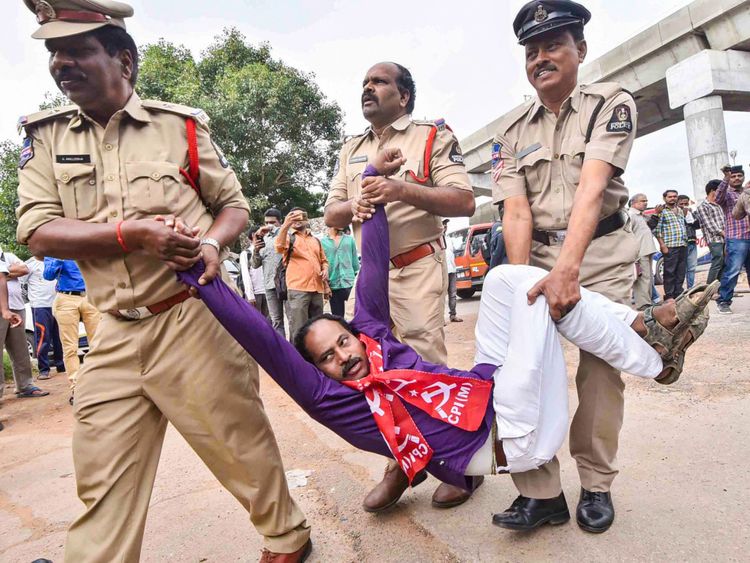
Hyderabad: What appeared initially a routine trade union spat between the management and the workers has turned out to be the longest strike of public transport sector in any state in India with a crippling impact.
Nearly 50,000 employees of Telangana State Road Transport Corporation went on strike on October 5 after talks failed.
After almost a month not only the deadlock continues but the very existence of the RTC was in danger.
With its own fleets of 10500 buses and 1500 hired buses, TSRTC is the biggest employer in state public sector.
Chief Minister K Chandrasekhar Rao- in whose success in creating separate Telangana state the indefinite strike by the RTC employees had played a crucial role — has adopted an unusually tough stand.
“What RTC strike? The RTC itself will come to an end now,” was how he announced his intention to wind up the corporation. Again for the first time anywhere in the country he declared that all the employees of RTC stand “self dismissed”.
RTC employees, under the banner of Joint Action Committee of several unions have also refused to budge. “Come what may we will continue our struggle till all our demands are met”, said JAC convenor Ashwaddhama Reddy. “The real intention of the government is to privatise RTC and sell its assets to its cronies”.
What are the demands?
JAC has made 26 demands, mainly the merger of the RTC with the state government so the corporation workers get treated at par with the other government employees. The other demands include government clearing all the dues of RTC to the tune of nearly Rs20 billion, filling the 7000 vacancies and abolishing Moto Vehicle Tax on the corporation buses. They also want workers to be paid the due salaries for the period of mass strike in 2011 in support of separate Telangana state.
The demand for merger was spurred by two factors. Firstly the union leaders claim that KCR as the head of Telangana Rashtra Samiti (TRS) had made an election promise of doing so. Secondly in the neighbouring Andhra Pradesh, Jaganmohan Reddy government has already initiated the process of merger.
What is government’s stand?
Chief Minister KCR has flatly refused to even consider the demand citing the RTC had accumulated losses of Rs5,000 crore (Rs50 billion) and the state government’s financial situation does not permit to take this burden. The government also fears that if RTC was merged, other corporations will also make similar demands.
Secondly the government argues that despite best efforts RTC continues to incur annual losses. “While RTC operations are losing money, the private buses are making profits”, said Sunil Sharma, the acting managing director of the RTC supporting the government’s proposal to partially privatise the public transport.
What happened in the strike so far?
In view of the stubborn attitude of the government, the JAC has enlisted the support of all the opposition parties, and unions and organisations of other government employees, students, youth and women. They have successfully sustained the strike by organising different programs every day including community kitchens and mass lunch on roads, a general strike and a massive public meeting.
While opposition parties have extend full support the leaders of ruling TRS allege that the strike itself was a conspiracy by the opposition.
Is there any politics behind the strike?
With the opposition parties including the Congress, BJP and the left extending support to the stir, political factors also seems to be at play in the strike. Chief Minister was angry that the JAC was playing in the hands of the opposition parties. Frustrated by the government’s attitude four RTC employees have committed suicide and 8 others died of heart attacks since the strike. KCR in his typical style said, “The responsibility of the deaths lie with those who called the strike”. After initially refusing to have any more talks with the JAC, Chief Minister had to bow to the direction of High Court and asked the RTC top officials to talk to the union leaders. But nothing came out of it and the matter was pending before a division bench of the High Court.
What the RTC management says?
While JAC was demanding clearance of dues, the management claimed that the government had already paid to RTC more than what was due. According to the JAC in the Hyderabad city region itself, the RTC had incurred a loss of Rs17.86 billion and the government should reimburse it. RTC MD Sunil Sharma told the High Court in affidavit that the government had paid Rs644.51 crore for the year 2018-19. But it expressed its inability to make such reimbursement in future citing a resolution by the Hyderabad Municipal Corporation that it could not afford to pay in view of critical financial status. The High Court has expressed its dissatisfaction with the evasive replies of the state government.
How are people coping?
In a state with a population of about 40 million the public buses were the backbone of transport system. While in state capital Hyderabad, the people at least have some alternatives in the form of Hyderabad Metro rail, local trains and about 200,000 autos or three wheelers, the people in the rural areas were the worst hit by the strike without any alternatives. The government tried to ease the situation by recruiting temporary staff and also running the private buses, but it could not meet even 30% of the requirement.
What is the history of RTC?
If the government goes ahead with plans of eventually closing down RTC and handing over the public transport to private operators, it will be curtains for an interesting piece of history.
The RTC roots go back to the era of last Nizam Mir Osman Ali Khan. Erstwhile Asif Jahi government of Hyderabad was the first to introduce the public transport buses in India. Nizam had brought 27 buses manufactured by Scottish company Albion Automotives to start the Public Transport Department. As a mark of respect to his mother Zahra Begum, Nizam introduced letter “Z” in the registration of all the buses, a tradition which continues till date. Even today all the RTC buses have this letter. Later it became Andhra Pradesh State Road Transport Corporation in 1958 providing the bus service in the entire state. in 2014 after the division of the state, RTC was also bifurcated into AP RTC and Telangana RTC.













